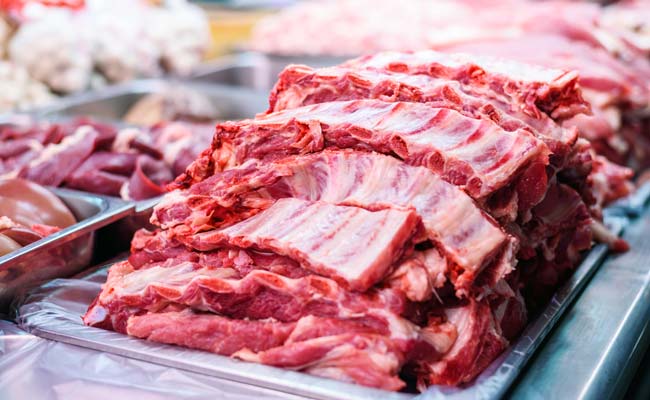
India’s meat exports down with viral infections
The Dollar Business Bureau  All is not well with India’s exports of animal products. The industry has been facing huge challenge from infections like bird flu and foot-and-mouth diseases in the past three years. According to a government data, the total export volume of various animal products was US$ 4.54 billion from April 2014 to Feb 2015. Though the volume of trade increased marginally from US$ 4.47 billion registered during previous year, the quantity of exported products decreased from 17.41 lakh tonnes to 16.23 lakh tonnes in the past two years. Of the total volume, buffalo meat exports contributed a major share of 4.4 billion with the supply of 13.56 lakh tonnes in the international market, the government data said. India also supplies animal casings, sheep/goat meat and processed meat to the international market. Though importing countries have not formally banned products from India, traders overseas are apprehensive about Indian meats. Countries of European Union (EU), China and Indonesia are not allowing imports of Indian buffalo meat citing reasons like prevalence of foot-and-mouth disease (FMD) in India. “However, in general, there are no bans imposed by these countries,” said Nirmala Sitharaman, Minister of State, Commerce and Industry. India’s share in the world trade of animal products for 2013 was 0.89%, according to the UN Comtrade data. “The government has been flagging the issue of market access of Indian buffalo meat with EU, China and Indonesia from time to time on different platforms,” the minister told Lok Sabha in a written reply on Friday. The minister attributed the low share in the international trade to increased consumption, prevalence of diseases and non-tariff issues among competing markets. “Some of the reasons for our negligible share in world trade are high consumption base, relatively low productivity, prevalence of various livestock diseases such as FMD, impeding market access to Indian livestock products, several quality, and non-tariff issues from major competing countries, intermittent outbreaks of avian influenza, lack of modern food processing infrastructure etc,” she said. The government has taken several steps to ensure quality of meat export in line with the rules and requirements of importing countries. The export of frozen meat is allowed as per the Export (Quality Control and Inspection) Act. As per the Act, each consignment of meat must carry a veterinary health certificate issued by the designated authorities. Only those meat consignments that conform to the standards and specifications are allowed for exports. In order to ensure quality of meat for international markets, the Agricultural and Processed Food Products Export Development Authority (APEDA), a government body, helps exporters to overcome issues. The APEDA also organises participation in international exhibitions to create awareness for Indian animal product exporters.
All is not well with India’s exports of animal products. The industry has been facing huge challenge from infections like bird flu and foot-and-mouth diseases in the past three years. According to a government data, the total export volume of various animal products was US$ 4.54 billion from April 2014 to Feb 2015. Though the volume of trade increased marginally from US$ 4.47 billion registered during previous year, the quantity of exported products decreased from 17.41 lakh tonnes to 16.23 lakh tonnes in the past two years. Of the total volume, buffalo meat exports contributed a major share of 4.4 billion with the supply of 13.56 lakh tonnes in the international market, the government data said. India also supplies animal casings, sheep/goat meat and processed meat to the international market. Though importing countries have not formally banned products from India, traders overseas are apprehensive about Indian meats. Countries of European Union (EU), China and Indonesia are not allowing imports of Indian buffalo meat citing reasons like prevalence of foot-and-mouth disease (FMD) in India. “However, in general, there are no bans imposed by these countries,” said Nirmala Sitharaman, Minister of State, Commerce and Industry. India’s share in the world trade of animal products for 2013 was 0.89%, according to the UN Comtrade data. “The government has been flagging the issue of market access of Indian buffalo meat with EU, China and Indonesia from time to time on different platforms,” the minister told Lok Sabha in a written reply on Friday. The minister attributed the low share in the international trade to increased consumption, prevalence of diseases and non-tariff issues among competing markets. “Some of the reasons for our negligible share in world trade are high consumption base, relatively low productivity, prevalence of various livestock diseases such as FMD, impeding market access to Indian livestock products, several quality, and non-tariff issues from major competing countries, intermittent outbreaks of avian influenza, lack of modern food processing infrastructure etc,” she said. The government has taken several steps to ensure quality of meat export in line with the rules and requirements of importing countries. The export of frozen meat is allowed as per the Export (Quality Control and Inspection) Act. As per the Act, each consignment of meat must carry a veterinary health certificate issued by the designated authorities. Only those meat consignments that conform to the standards and specifications are allowed for exports. In order to ensure quality of meat for international markets, the Agricultural and Processed Food Products Export Development Authority (APEDA), a government body, helps exporters to overcome issues. The APEDA also organises participation in international exhibitions to create awareness for Indian animal product exporters.
This article was published on April 25, 2015 –6:22 pm IST.






 to success.
to success.